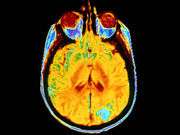Experimental mood induction impacts IL-18 levels

(HealthDay)—Experimental mood induction changes interleukin (IL)-18 levels and is associated with changes in central opioid neurotransmission, according to a study published recently in Molecular Psychiatry.
Noting that there are strong associations between baseline IL-18 and µ-opioid receptor availability in major depressive disorder (MDD), Alan R. Prossin, M.D., from the University of Texas Health Science Center at Houston, and colleagues hypothesized that experimental mood induction would change IL-18. They examined the impact of experimental induced mood (sad, neutral) on plasma IL-18 and correlations with concurrent changes in central opioid neurotransmission in 28 volunteers (healthy or with MDD).
The researchers found that mood induction affected IL-18 (P < 0.001), with sadness increasing IL-18 (P = 0.01) and neutral mood decreasing IL-18 (P < 0.001). Changes in IL-18 were more pronounced in depressed volunteers (P = 0.03), and were linearly proportional to activation of µ-opioid induced by sadness.
"These data demonstrate that dynamic changes of a pro-inflammatory IL-1 superfamily cytokine, IL-18, and its relationship to µ-opioid neurotransmission in response to experimentally induced sadness," the authors write. "Further testing is warranted to delineate the role of neuroimmune interactions involving IL-18 in enhancing susceptibility to medical illness (that is, diabetes, heart disease, and persistent pain states) in depressed individuals."
One author disclosed financial ties to the pharmaceutical industry.
More information: Full Text
Copyright © 2015 HealthDay. All rights reserved.


















